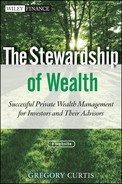Conclusion: Fixing the Industry
Alas, in the four years since the crisis came under control in the United States (it's still raging in Europe), little has changed. In early 2012, a Goldman Sachs vice president, Greg Smith, resigned publicly by publishing his letter of resignation in the New York Times. Smith said in his letter that “the environment [at Goldman Sachs] now is as toxic and destructive as I have ever seen it … I truly believe that this decline in the firm's moral fiber represents the single most serious threat to its long-run survival.”11 Goldman may be the worst offender, but the other large banks aren't far behind.
At great expense to the taxpaying public, the banks have been yanked out of their own cesspools. But however urgent it may have been to preserve the financial system, the cost has been staggering, in both dollars and in ethical terms. It is patently clear that one doesn't convert rogue companies into model corporate citizens by merging them into each other or by converting them into bank holding companies.
Instead, I modestly propose the following three reforms:
Anyone who has watched developments in the financial industry over the past five years would likely find these suggestions to be Pollyannaish in the extreme. And no doubt top executives in the industry will be horrified. But in every other industry these behaviors are routine, ingrained in employees from their earliest years and demanded by top executives and boards of directors.
Emphasis on serving the customer is and has been for many years a mantra in most industry sectors. Ideas like Six Sigma, TQM, kaizen, quality circles, and the Toyota Production System are designed to help companies deliver the best possible products and services to their customers—an idea apparently unknown in the financial industry. As for conflicts of interest, they have been ruthlessly rooted out of most industries, including even the nonprofit world and the political world. But conflicts are mainly what the financial industry is all about: “No conflict, no interest.”
But I remember back in 1987 when Paul O'Neill, later to be Secretary of the Treasury, became CEO of Alcoa. Alcoa was then a sinking, Rust Belt aluminum producer, its stock price long mired in the single digits.12 If O'Neill had spent his career in the financial industry it's not hard to guess what he would have done: cut costs, cut customer service, demand longer hours from his employees. This would have raised quarterly earnings briefly, O'Neill would have cashed out, and when Alcoa sank even further into the muck he would have glided off into the sunset supported by his bright golden parachute.
But not being from the financial industry, none of this occurred to O'Neill. Instead, he focused his major attention on worker safety. At the time, Alcoa had one of the worst safety records in its or any other industry, and—guess what?—employees reciprocated by demonstrating a like concern for the firm and its customers. O'Neill demonstrated something else: that he cared about employees and their safety. Even low-ranking employees were given the power to stop production if they saw a safety issue. And the employees responded in kind, converting this sleepy also-ran into one of the most efficient, safe, and quality-conscious firms in the world. Profits soared, as did Alcoa's stock and the firm's reputation. Sure, O'Neill made a lot of money as Alcoa's CEO, but he earned it and he is as revered today among Alcoa employees as he was way back then.
Is anyone on Wall Street listening?
